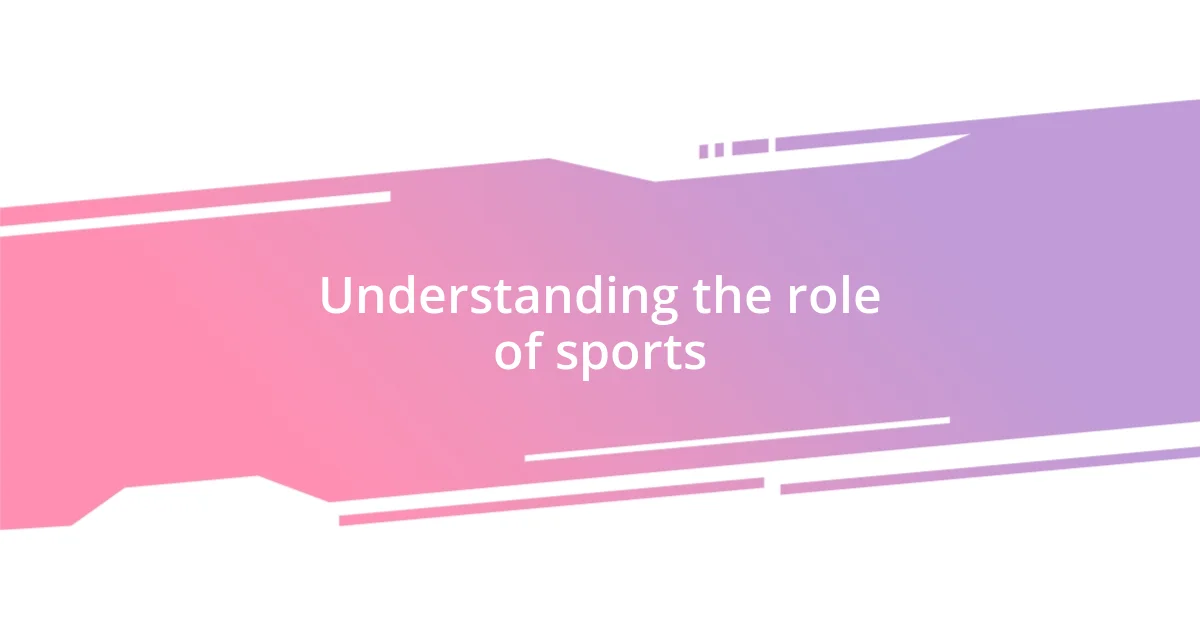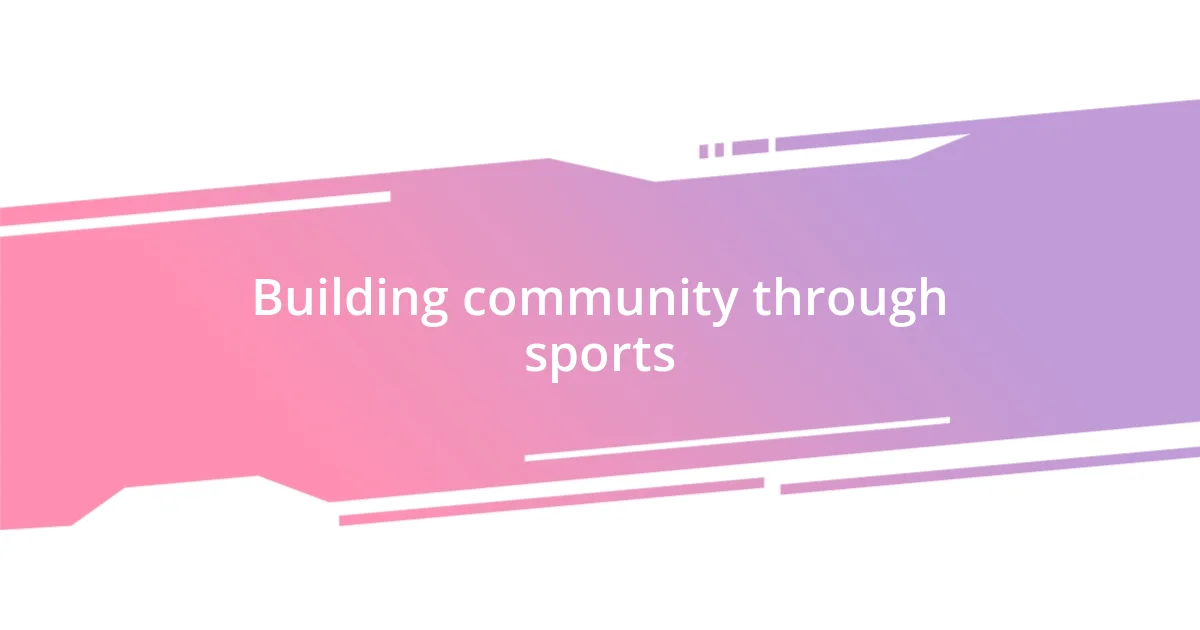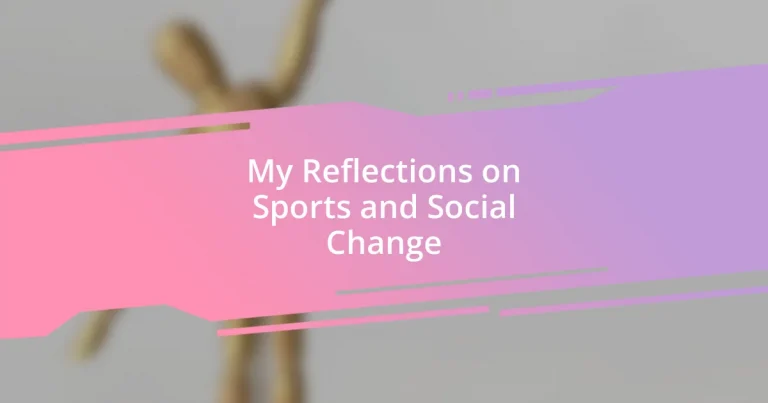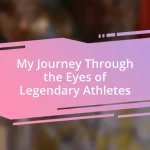Key takeaways:
- Sports can break down societal barriers and foster unity, as seen in community events like soccer matches.
- Historical moments, such as the 1968 Olympic Black Power salute, illustrate how athletes use their platforms to advocate for social change.
- Programs like “Right to Play” and “Peace Players International” demonstrate how sports can promote healing, dialogue, and understanding in divided communities.

Understanding the role of sports
Sports play a profound role in society, serving as a microcosm of broader social dynamics. Reflecting on my own experiences, I’ve seen how a simple game can break down barriers. I remember participating in a community soccer match, and with every goal scored, the cheers felt like a rallying cry for unity among diverse backgrounds. Isn’t it fascinating how a shared passion can bring people together, transcending differences?
Moreover, sports often challenge social norms and encourage dialogue around important issues. I once attended a panel discussion led by athletes advocating for mental health awareness, sharing their struggles and triumphs. Hearing their stories made me realize the power of vulnerability; it not only humanizes the athletes but also sparks crucial conversations within our communities. How often do we overlook the voices of those who can inspire real change?
Lastly, the influence of sports extends beyond just entertainment; it is an agent for activism. I vividly recall watching an athlete take a knee during the national anthem, igniting conversations about racial equality and justice. This moment prompted me to reflect on my own beliefs. Isn’t it compelling how a single act on a field can resonate in countless lives, urging us to take a stand? In every corner of the athletic world, there’s potential for change that we shouldn’t ignore.

Historical examples of sports impact
Sport has long been a catalyst for social change, shaping norms and narratives. Take the “Olympic Project for Human Rights” in the 1968 Mexico City Olympics, where Tommie Smith and John Carlos raised their fists in a Black Power salute. I remember being struck by that moment when I first learned about it—this was more than a protest; it was a powerful statement that demanded attention. Witnessing athletes use their platform to advocate for equality left a lasting impression on me about the potential sports have to amplify important social issues.
Another notable example is the role of women in sports during the Title IX era in the 1970s. As I read about the surge of female athletes stepping into the limelight, I felt a profound sense of empowerment. I recall watching Billie Jean King rally against Bobby Riggs in the “Battle of the Sexes.” It wasn’t just a tennis match; it symbolized the fight for gender equality. That match became a turning point, challenging societal views on women’s capabilities and inspiring generations to pursue their passions regardless of gender norms.
Let’s not forget the 1995 Rugby World Cup in South Africa. The unification of a divided nation under Nelson Mandela’s leadership showcased how sports could heal wounds created by apartheid. I was deeply moved when I saw footage of Mandela wearing the Springboks jersey, which once represented oppression. His message of reconciliation through this sport taught me that sometimes, victory isn’t just about winning; it’s about fostering understanding and brotherhood among diverse groups, creating a legacy that lasts far beyond the final whistle.
| Event | Impact |
|---|---|
| 1968 Olympic Games | Black Power salute symbolizing racial equality |
| Title IX (1972) | Empowerment and equality for women in sports |
| 1995 Rugby World Cup | Unification of South Africa post-apartheid |

Case studies of sports initiatives
Sports initiatives often serve as powerful tools for social change, providing not just a platform for athletic prowess but also a space for dialogue and community building. One initiative that particularly resonates with me is the “Right to Play” program. I had the chance to volunteer with them once, and I was amazed by how sports were used to engage children in war-torn regions. The laughter and joy during a simple game of soccer were palpable; it felt like a moment of respite from their harsh realities.
Another compelling case is the “Peace Players International” initiative, which brings together youth from divided communities to play basketball. I remember watching a documentary on their work in Israel and Palestine, where I saw kids from opposing sides forming friendships while working together towards a common goal. Witnessing their camaraderie made me reflect on how sports can shape interactions and foster understanding, even in the most divided societies.
Some notable sports initiatives include:
- Right to Play: Utilizing sports to aid children in conflict zones, providing them an escape and a sense of normalcy.
- Peace Players International: Connecting youth from divided communities through basketball, fostering dialogue and understanding.
- Kick It Out: Addressing racism in football, promoting inclusivity and equality on and off the pitch.
These examples showcase not only the role of sports in uniting people but also how these initiatives spark essential conversations about critical social issues.

Building community through sports
Building community through sports is more than just playing games; it’s about connection and shared experiences. I remember the local soccer league in my neighborhood when I was a kid. It wasn’t just about winning trophies; it was a gathering place. Families would come to cheer, and friendships blossomed among players and parents alike. Those Saturdays spent on the field fostered a sense of belonging that extended beyond the game itself. Have you ever felt that magic when groups come together for a common purpose?
Consider the way teams can build bridges across cultural divides. I participated in a community basketball tournament where teams from different backgrounds played together. The court became a melting pot of traditions and stories. Whenever a basket was made or a great play executed, you could feel the energy shift. It was incredible to see how something as simple as basketball could spark conversations and friendships that might never have happened otherwise. Isn’t it fascinating how sports can create spaces where we literally share our highs and lows?
Throughout my experiences, I’ve learned that sports have an inherent ability to unite. I remember one evening after a particularly intense match; the teams convened for a shared dinner. We laughed, learned about each other’s cultures, and, most importantly, celebrated our shared humanity. Those moments reinforced to me that community is built not just through competition, but through collaboration, respect, and an understanding that we’re all in this together. Isn’t that what community is truly about?













